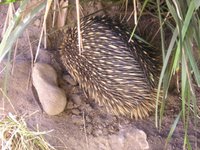 I was looking at the White Rose e-print repository (run for the Universities of Sheffield, Leeds and York at http://eprints.whiterose.ac.uk/), thinking I ought to put my papers on it, when I ran across:
I was looking at the White Rose e-print repository (run for the Universities of Sheffield, Leeds and York at http://eprints.whiterose.ac.uk/), thinking I ought to put my papers on it, when I ran across:Noble, J., Tucci, E. and Todd, P.M. (1999) Social learning and information sharing: an evolutionary simulation model of foraging in Norway rats. In: Advances in artificial life : 5th European Conference, ECAL'99, Lausanne, Switzerland, September, 1999 : proceedings. Springer Verlag: Berlin. pp. 514-523.
Basically, rats recognise that they need information about where to get food. They come across smells of novel kinds of food in various ways. However, they have identified that a good way of evaluating whether this is information they should use or not is by whether they encounter the smell on the breath of another rat that's just eaten the food (the idea being that if Rat B has eaten the food and Rat B is still breathing, the new food must be OK). Rat A then jogs away to the new food, accesses it and synthesises it.
OK, that isn't exactly how the authors put it, but they were talking about information sharing. One thing that had emerged was that the rats didn't distinguish between ill and well rats who'd eaten, so sometimes Rat A might smell the food on Rat B's breath, think "great" and go and eat the new food, and then die like Rat B did shortly after having its breath smelt. The authors of this paper did a computer simulation on this, and concluded that, basically, this didn't happen often enough for it to be an issue in the great genetic scheme of things, as generally speaking this approach worked OK. When they were in a toxic environment rats were more cautious anyway, and when food was sparse being too cautious might be as lethal (because of starvation) as not being cautious enough.
This was "a seemingly complex example of social (or even cultural) information transmission can be explained through the action of simple behaviours in an appropriately structured environment - an instance of ecological rationality." Some information seeking researchers have looked at information behaviour as a hunting/foraging etc activity, and there is increasing interest in ethnography as a research approach for information literacy. Therefore this reminded me - well, first of all how humans are, after all, mammals - and then how useful the kind of research is that examines information behaviour and relates it to the conditions under which that behaviour takes place. Which brings me neatly on to the latest issue of Information Research which has the first batch of papers from the Information Seeking In Context conference that took place last month in Sydney, Australia. (where I took the photo of the Echidna, in Sydney Zoo, in 2004)
Although it is REALLY gros thinking about rats, this is fascinating stuff.
ReplyDeleteAt least they weren't ACTUALLY poisoning the rats. I've felt kinder about rats in general terms since going to a fancy rat show years ago, where the rats were all clean and intellgent looking. It wouldn't make me any happier to find one in my cellar, though.
ReplyDelete